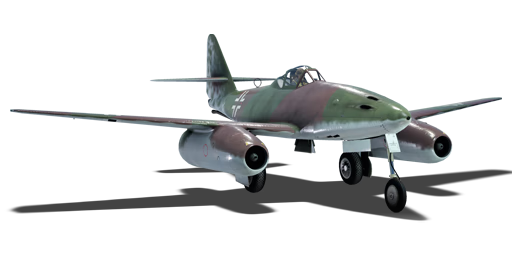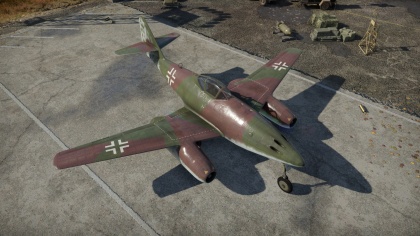Me 262 C-1a
Contents
| This page is about the German jet fighter Me 262 C-1a. For other variants, see Me 262 (Family). |
Description
The Me 262 C-1a Heimatschützer I is a rank German jet fighter
with a battle rating of (AB), (RB), and (SB). It was introduced in Update 1.39.
The Me 262 C-1a Heimatschützer I is a Me 262 A-1a fitted with a rocket booster in its tail. It is intended as an interceptor, climbing very quickly under the power of the booster rocket combined with its two jet engines. However, the boosters have a small fuel supply and shut down minutes after takeoff. Without its booster rocket, the Heimatschützer functions very similarly to the Me 262 A-1a. It has the same armament as the Me 262 A-1.
General info
Flight performance
| Characteristics | Max Speed (km/h at 6,000 m) |
Max altitude (metres) |
Turn time (seconds) |
Rate of climb (metres/second) |
Take-off run (metres) | |||
|---|---|---|---|---|---|---|---|---|
| AB | RB | AB | RB | AB | RB | |||
| Stock | 825 | 800 | 31.7 | 32.7 | 16.6 | 15.7 | 628 | |
| Upgraded | 906 | 865 | 29.0 | 30.3 | 23.8 | 20.0 | ||
Details
| Features | |||||
|---|---|---|---|---|---|
| Combat flaps | Take-off flaps | Landing flaps | Air brakes | Arrestor gear | Drogue chute |
| ✓ | ✓ | ✓ | X | X | X |
| Limits | ||||||
|---|---|---|---|---|---|---|
| Wings (km/h) | Gear (km/h) | Flaps (km/h) | Max Static G | |||
| Combat | Take-off | Landing | + | - | ||
| 580 | 580 | 380 | ~14 | ~7 | ||
| Optimal velocities (km/h) | |||
|---|---|---|---|
| Ailerons | Rudder | Elevators | Radiator |
| < 500 | < 600 | < 680 | N/A |
Engine performance
| Engine | Aircraft mass | |||||
|---|---|---|---|---|---|---|
| Engine name | Number | Empty mass | Wing loading (full fuel, no booster fuel) | |||
| Junkers Jumo 004B-1 | 2 | 4,995 kg | 269 kg/m2 | |||
| Engine characteristics | Mass with fuel (no weapons load, no booster fuel) | Max Takeoff Weight | ||||
| Weight (each) | Type | 6m fuel | 20m fuel | 22m fuel | ||
| 720 kg | Axial-flow turbojet | 5,247 kg | 5,777 kg | 5,953 kg | 7,800 kg | |
| Maximum engine thrust @ 0 m (RB / SB) | Thrust to weight ratio @ 0 m (100%, no booster) | |||||
| Condition | 100% | WEP | 6m fuel | 20m fuel | 22m fuel | MTOW |
| Stationary | 910 kgf | N/A | 0.35 | 0.32 | 0.31 | 0.23 |
| Optimal | 910 kgf (0 km/h) |
N/A | 0.35 | 0.32 | 0.31 | 0.23 |
| Booster (Walter HWK 109-509S - Liquid-fuel rocket) | Aircraft mass | |||||||
|---|---|---|---|---|---|---|---|---|
| Number | Booster weight (each) |
Fuel weight (each) |
Burn Time |
Can be shutdown |
Jettisoned after use |
Mass with full booster fuel (no weapons load) | ||
| 6m fuel | 20m fuel | 22m fuel | ||||||
| 1 | 165 kg | 1,700 kg | 172s | Yes | No | 6,947 kg | 7,477 kg | 7,653 kg |
| Condition | Maximum booster thrust @ 0 m (RB / SB) |
Combined engine & booster thrust @ 0 m |
Thrust to weight ratio @ 0 m (100% with booster) | |||||
| 6m fuel | 20m fuel | 22m fuel | ||||||
| Stationary | 1,692 kgf | 3,512 kgf | 0.51 | 0.47 | 0.46 | |||
| Optimal | 1,692 kgf (any speed) |
3,512 kgf (0kph) |
0.51 | 0.47 | 0.46 | |||
Survivability and armour
- 15 mm Steel - Behind pilot
- 15 mm Steel - Pilot's headrest
- 15 mm Steel - Between cockpit and fore fuel tank
- 15 mm Steel - Instrument panel plate
- 16 mm Steel x 2 - Ammunition protection plates
- 90 mm Bulletproof glass
Armaments
Offensive armament
The Me 262 C-1a is armed with:
- 4 x 30 mm MK 108 cannons, nose-mounted (2 x 100 rpg top + 2 x 80 rpg bottom = 360 total)
The Heimatschutzer I's cannon armament consists of four nose-mounted 30 mm Mk 108 autocannons. It has the same armament as the Me 262 A-1a. The Me 262 A-1a and the Me 262 C-1a Heimatschützer have the same burst mass of 14.52 kg/s (32.01 lbs/s).
Usage in battles
Describe the tactics of playing in the aircraft, the features of using aircraft in a team and advice on tactics. Refrain from creating a "guide" - do not impose a single point of view, but instead, give the reader food for thought. Examine the most dangerous enemies and give recommendations on fighting them. If necessary, note the specifics of the game in different modes (AB, RB, SB).
Modules
| Tier | Flight performance | Survivability | Weaponry | |
|---|---|---|---|---|
| I | Fuselage repair | Offensive 30 mm | ||
| II | Compressor | Airframe | ||
| III | Wings repair | New 30 mm cannons | ||
| IV | Engine | Cover | ||
The biggest issue of the Heimatschützer I is it's poor acceleration across all speeds when the boosters are out of fuel. Thus, the "Compressor" and "New Engine" modifications should have the highest priority. The default ammo belts are decent, but the high explosive content increases with the new ammo. Because of this, researching the 30 mm Belts modification is not a bad idea. The "New Cannons" modification can also be researched to improve the accuracy and reliability of the 30 mm cannons.
Pros and cons
Pros:
- Heavy armament of four 30 mm cannons
- Decent energy retention
- It has a rocket engine, allowing a climb to about 4000 m (13000 ft) within 1.5 minutes
Cons:
- Slow in comparison to other jets it may encounter
- Rocket propulsion is limited
- Its 30 mm guns are not optimal for jet combat, with low muzzle velocity and effective range
- Without its booster, it is a fairly slow climber
- Sluggish at high speeds due to control surface compression
History
Describe the history of the creation and combat usage of the aircraft in more detail than in the introduction. If the historical reference turns out to be too long, take it to a separate article, taking a link to the article about the vehicle and adding a block "/History" (example: https://wiki.warthunder.com/(Vehicle-name)/History) and add a link to it here using the main template. Be sure to reference text and sources by using <ref></ref>, as well as adding them at the end of the article with <references />. This section may also include the vehicle's dev blog entry (if applicable) and the in-game encyclopedia description (under === In-game description ===, also if applicable).
Media
- Skins
- Videos
See also
Links to the articles on the War Thunder Wiki that you think will be useful for the reader, for example:
- reference to the series of the aircraft;
- links to approximate analogues of other nations and research trees.
External links
Paste links to sources and external resources, such as:
- topic on the official game forum;
- encyclopedia page on the aircraft;
- other literature.
| Germany jet aircraft | |
|---|---|
| |
Luftwaffe |
| He 162 | He 162 A-1 · He 162 A-2 |
| Me 163 | Me 163 B · Me 163 B-0 |
| Ho 229 | Ho 229 V3 |
| Ar 234 | Ar 234 B-2 · Ar 234 C-3 |
| Me 262 | Me 262 A-1a · Me 262 A-1a/Jabo · Me 262 A-1a/U1 · Me 262 A-1/U4 · Me 262 A-2a |
| Me 262 C-1a · Me 262 C-2b | |
| |
LSK |
| Fighters | ◊MiG-15bis · ◊Lim-5P · ◊MiG-19S |
| ◊MiG-21MF · ◊MiG-21bis-SAU · ◊MiG-21 "Lazur-M" | |
| ◊MiG-29 | |
| Attackers | ◊MiG-23BN · ◊MiG-23MF · ◊MiG-23MLA |
| ◊Su-22UM3K · ◊Su-22M4 | |
| ◊IL-28 | |
| |
Luftwaffe |
| F-84 | ◄F-84F |
| F-86 | ◄CL-13A Mk 5 · ◄CL-13B Mk.6 · ◄F-86K |
| F-104 | ◄F-104G |
| F-4 | ◄F-4F Early · ◄F-4F · ◄F-4F KWS LV |
| G.91 | ◄G.91 R/3 · ◄G.91 R/4 |
| Tornado | ◄Tornado IDS WTD61 · ◄Tornado IDS MFG · ◄Tornado IDS ASSTA1 |
| Other | Alpha Jet A · ◄Sea Hawk Mk.100 |
| Ex-LSK | ◄MiG-21 SPS-K · ◄MiG-29G · ◄Su-22M4 WTD61 |
| |
Swiss Air Force |
| ◌Hunter F.58 · FFA P-16 | |





